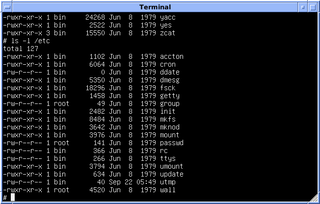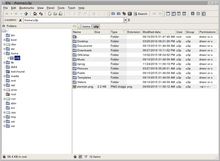
Cygwin is a Unix-like environment and command-line interface for Microsoft Windows. Cygwin's purpose is expressed in its motto: "Get that Linux feeling – on Windows".

A Unix shell is a command-line interpreter or shell that provides a command line user interface for Unix-like operating systems. The shell is both an interactive command language and a scripting language, and is used by the operating system to control the execution of the system using shell scripts.

A man page is a form of software documentation usually found on a Unix or Unix-like operating system. Topics covered include computer programs, formal standards and conventions, and even abstract concepts. A user may invoke a man page by issuing the man command.
The Open Sound System (OSS) is an interface for making and capturing sound in Unix and Unix-like operating systems. It is based on standard Unix devices system calls. The term also sometimes refers to the software in a Unix kernel that provides the OSS interface; it can be thought of as a device driver for sound controller hardware. The goal of OSS is to allow the writing of sound-based applications that are agnostic of the underlying sound hardware.
The GNU C Library, commonly known as glibc, is the GNU Project's implementation of the C standard library. Despite its name, it now also directly supports C++. It was started in the 1980s by the Free Software Foundation (FSF) for the GNU operating system.

Texinfo is a typesetting syntax used for generating documentation in both on-line and printed form with a single source file. It is implemented by a computer program released as free software of the same name, created and made available by the GNU Project from the Free Software Foundation.
GNU Aspell, usually called just Aspell, is a free software spell checker designed to replace Ispell. It is the standard spell checker for the GNU operating system. It also compiles for other Unix-like operating systems and Windows. The main program is licensed under the GNU Lesser General Public License, the documentation under the GNU Free Documentation License. Dictionaries for it are available for about 70 languages. The primary maintainer is Kevin Atkinson.
Ctags is a programming tool that generates an index file of names found in source and header files of various programming languages to aid code comprehension. Depending on the language, functions, variables, class members, macros and so on may be indexed. These tags allow definitions to be quickly and easily located by a text editor, a code search engine, or other utility. Alternatively, there is also an output mode that generates a cross reference file, listing information about various names found in a set of language files in human-readable form.

Unix time is a date and time representation widely used in computing. It measures time by the number of seconds that have elapsed since 00:00:00 UTC on 1 January 1970, the Unix epoch, without adjustments made due to leap seconds. In modern computing, values are sometimes stored with higher granularity, such as microseconds or nanoseconds.

The FOX toolkit is an open-source, cross-platform widget toolkit, i.e. a library of basic elements for building a graphical user interface (GUI). FOX stands for Free Objects for X.
Filesystem in Userspace (FUSE) is a software interface for Unix and Unix-like computer operating systems that lets non-privileged users create their own file systems without editing kernel code. This is achieved by running file system code in user space while the FUSE module provides only a bridge to the actual kernel interfaces.

In Unix-based computer operating systems, init is the first process started during booting of the operating system. Init is a daemon process that continues running until the system is shut down. It is the direct or indirect ancestor of all other processes and automatically adopts all orphaned processes. Init is started by the kernel during the booting process; a kernel panic will occur if the kernel is unable to start it, or it should die for any reason. Init is typically assigned process identifier 1.
The following tables compare general and technical information between a number of notable IRC client programs which have been discussed in independent, reliable prior published sources.

In software development, CMake is cross-platform free and open-source software for build automation, testing, packaging and installation of software by using a compiler-independent method. CMake is not a build system itself; it generates another system's build files. It supports directory hierarchies and applications that depend on multiple libraries. It is used in conjunction with native build environments such as Make, Qt Creator, Ninja, Android Studio, Apple's Xcode, and Microsoft Visual Studio. It has minimal dependencies, requiring only a C++ compiler on its own build system.
A desktop environment is a collection of software designed to give functionality and a certain look and feel to an operating system.
This is a comparison of notable free and open-source configuration management software, suitable for tasks like server configuration, orchestration and infrastructure as code typically performed by a system administrator.

GNU Emacs is a free software text editor. It was created by GNU Project founder Richard Stallman, based on the Emacs editor developed for Unix operating systems. GNU Emacs has been a central component of the GNU project and a flagship project of the free software movement. Its tag line is "the extensible self-documenting text editor."

Unix is a family of multitasking, multi-user computer operating systems that derive from the original AT&T Unix, whose development started in 1969 at the Bell Labs research center by Ken Thompson, Dennis Ritchie, and others.
Ansible is a suite of software tools that enables infrastructure as code. It is open-source and the suite includes software provisioning, configuration management, and application deployment functionality.

SerenityOS is a free and open source desktop operating system that has been in continuous development since 2018. Initially the one-man project of Swedish programmer Andreas Kling, SerenityOS is now developed by a community of hobbyists. The system supports the x86-64 instruction set, features a preemptive kernel, and hosts multiple complex applications including its own web browser, Ladybird, and integrated development environment (IDE).









